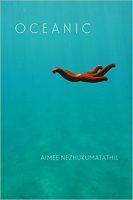April 27, 2018
Edited by David Sanders
Specimen Days
1882—Ralph Waldo Emerson, American poet (Representive Men), dies of pneumonia at 78.
1904—Cecil Day-Lewis, Irish poet (British Poet Laureate 1968-72), is born.
1904—Ragnar Skrede, Norwegian poet (Lauvfall), dies.
1920—Edwin Morgan, Scottish poet, dies.
1932—Harold "Hart" Crane, US poet (Bridge), commits suicide at 32.
1991—Marcus Heeresma, writer/poet (Anna, Son of a Whore), dies.

Where Are The War Poets?
They who in folly or mere greed
Enslaved religion, markets, laws,
Borrow our language now and bid
Us to speak up in freedom's cause.
It is the logic of our times,
No subject for immortal verse —
That we who lived by honest dreams
Defend the bad against the worse.
—C. Day-Lewis
“They who in folly or mere greed / Enslaved religion, markets, laws, / Borrow our language now and bid / Us to speak up in freedom’s cause.” C. Day-Lewis
World Poetry
B.C. Student Successfully Defends Thesis in Spoken-word Poems
Master's student explored her experience navigating the health system after being diagnosed with breast cancer

In what is believed to be a Canadian first, a master's student in Prince George, B.C., successfully defended a thesis delivered in the form of spoken-word poems. K. Darcy Taylor is in the English program at the University of Northern British Columbia. Her project explored her experiences after being diagnosed with "aggressive, invasive breast cancer" in 2005.
In what is believed to be a Canadian first, a master’s student successfully defended a thesis delivered in the form of spoken-word poems.
Recent Reviews
The Messy, Brilliant Life of Pablo Neruda
by Troy Jollimore
Few poets offer their biographers as rich a vein of material as the Chilean Nobel Prize-winner Pablo Neruda . Born in Parral, Chile, in 1904, Neruda transcended his modest origins and provincial upbringing to achieve success and significance far beyond the dreams of most writers . Books like “Twenty Love Poems and a Song of Despair,” “Residence on Earth ” and “Elemental Odes” have sold tens of millions of copies . Nearly 45 years after his death, Neruda continues to be regarded as one of the most significant poets of the 20 th century. In his home country, he remains a beloved and potent national symbol. Mark Eisner’s new biography, “Neruda: The Poet’s Calling,” explores the complex confluence of factors that accounts for Neruda’s extraordinary fame and success. Far more than most modern poetry, Neruda’s body of work is quite accessible — a fact that reflects not only his personal preferences but also his political views.
Wade in the Water review – Lost Voices of the American Underground
A long overdue collection from US poet laureate Tracy K Smith weaves a spiritual hymn to the nation’s forgotten people
by Kate Kellaway
Tracy K Smith is the poet laureate of the United States and a winner of the Pulitzer prize. Wade in the Water is, inexplicably, the first of her three collections to be published in the UK. The title is from a spiritual sung on the underground railroad that carried slaves to safety in the 19th century. Its centrepiece is a gathering of what are known as “erasure poems” – a strange term as what Smith is doing is the opposite of erasure. She is making visible the words of slaves and their owners, of African Americans enlisted in the civil war –these are found poems about people who were lost. Smith has pieced their correspondence together with the love of someone making a hand-stitched quilt.
Few poets offer their biographers as rich a vein of material as the Chilean Nobel Prize-winner Pablo Neruda.
Broadsides
Szymborska as Prophet
by Mohineet Boparai

There is a stark difference between the universal and the cultural, the true and the rational, and voice and language. In The End and the Beginning, as in her other works, Wislawa Szymborska floats through the universe. She enters space— a place without borders—and leaves the spatial, where implied borders are essential. She is always attached to the earth by a thread, though, no matter how far she travels. Szymborska can only temporarily defy gravity, you see. She must land back on earth and leave space if she is to survive.
Clarify Me, Please, God of the Galaxies: In Praise of the Poetry of Elizabeth Jennings
by Dana Gioia
The English poet Elizabeth Jennings had the peculiar fate of being in the right place at the right time in the wrong way. Her career began splendidly. Her verse appeared in prominent journals, championed by Oxford’s new generation of tastemakers. Her first publication, Poems (1953), launched the acclaimed Fantasy Poets pamphlet series, which would soon present the early work of Philip Larkin, Kingsley Amis, Thom Gunn, and Geoffrey Hill. Her first full-length collection, A Way of Looking (1955), won the Somerset Maugham Award and became the Poetry Book Society recommendation. She was the youngest poet featured in the first Penguin Modern Poets volume (1962). Meanwhile Jennings achieved enduring notoriety as the only female member of “The Movement,” the irreverent and contrarian group that dominated mid-century British poetry. By age thirty, Jennings was a celebrated writer.
Last Words
As we mourn the poet, do we not mourn the loss of what he had in his keeping: a way of living that served us for aeons?
by Sven Birkerts
I was in the last days of a family vacation in a house on a lake in northern Vermont when I got the news that Seamus Heaney had died. It was 30 August, not in the ‘dead of winter’, as when W B Yeats, his predecessor as greatest living Irish poet, had died, also at age 74. In his great poem on that loss, W H Auden had written ‘Let the Irish vessel lie/ Emptied of its poetry.’ Yeats died in January of 1939. Heaney was born in April of that year and, remarkably, the vessel was refilled. Now we await another elegist as great as Auden.
Sent to Coventry: Larkin’s “I Remember, I Remember”
by William Logan
On Philip Larkin’s poem of homecoming.
“Home is where the heart is.” “There’s no place like home.” “ ‘Home is the place where, when you have to go there,/ They have to take you in.’ ” “You can’t go home again.” No doubt even before the Odyssey the strain of homecoming was troubled by unwelcoming. For every Penelope weaving by day and unweaving by night, there are a hundred suitors waiting to kill you. Ovid was sent into exile for a “mistake” more tantalizing for remaining a mystery; had he returned to Rome without leave, Augustus would have put him to death. The longing for home is so universal, rare are the fictions where the prodigal son refuses to return.
In The End and the Beginning, as in her other works, Wislawa Szymborska floats through the universe.
Drafts & Fragments
Shaq Attacks Verse in New TV Series "Poetry in America"
by Andrew Dalton
Shaquille O'Neal called himself "The Big Baryshnikov" and "The Big Socrates" in his days in the NBA. Now he can add "The Big Shakespeare.” The basketball Hall-of-Famer, TNT TV analyst, commercial pitchman and onetime rapper is putting poetry on his lengthy resume as part of a new public television series.
Shaquille O’Neal called himself “The Big Baryshnikov” and “The Big Socrates” in his days in the NBA. Now he can add “The Big Shakespeare.”
Poetry In the News
Poet Sam Hamill, Founder of Copper Canyon Press, Dies at 74

Sam Hamill, a poet, translator and anti-war activist who as co-founder of Copper Canyon Press published works by Pablo Neruda, W.S. Merwin and many other celebrated poets, has died at age 74. Hamill died Saturday at his home in Anacortes, following a period of ill health. His death was announced by Copper Canyon, which he, Bill O’Daly and Tree Swenson helped start in 1972.
'Don't Call Us Dead' Poet Danez Smith Just Won The Inaugural Four Quartets Prize From The Poetry Society Of America
Just when you thought the world was trash, some good news comes along to make you reconsider everything. On Friday, the Poetry Society of America announced that Danez Smith had won its inaugural Four Quartets Prize for poetry. Don't Call Us Deadauthor Smith was one of three finalists — along with Geoffrey G. O'Brieniand Kathleen Pierce (Vault: a poem) — selected by the T. S. Eliot Foundation and the Poetry Society of America as potential winners.
Sam Hamill, a poet, translator and anti-war activist who as co-founder of Copper Canyon Press, has died at age 74.
New Books
Night School by Carl Dennis
[Paperback] Penguin Books, 112 pp., $20.00

The poems in Carl Dennis’s thirteenth collection, Night School, are informed by an engagement with a world not fully accessible to the light of day, a world that can only be known with help from the imagination, whether we focus on ourselves, on people close at hand, or on the larger society. Only if we imagine alternatives to our present selves, Dennis suggests, can we begin to grasp who we are. Only if we imagine what is hidden from us about the lives of others can those lives begin to seem whole. Only if we can conceive of a social world different from the one we seem to inhabit can we begin to make sense of the country we call our own. To read these poems is to find ourselves invited into a dialogue between what is present and what is absent that proves surprising and enlarging.
Brazen Creature by Anne Barngrover
[Paperback] The University of Akron Press, 72 pp., $15.95
Brazen Creature spans a young woman's awakening. The poems' concerns are twofold: violence against women and girls that has become rooted in the land, and verdant female desire and self-assertion in the face of entrenched oppression. In the poems' Midwestern towns and farmlands, patriarchy is a ghost that haunts the cottonwoods, soybean fields, and creek beds. The speaker is in limbo between fear and yearning, vulnerability and transgression, drought and flood, saving a life and needing to be saved.
Oceanic by Aimee Nezhukumatathil
[Paperback] Copper Canyon Press, 80 pp., $17.00

With inquisitive flair, Aimee Nezhukumatathil creates a thorough registry of the earth’s wonderful and terrible magic. In her fourth collection of poetry, she studies forms of love as diverse and abundant as the ocean itself. She brings to life a father penguin, a C-section scar, and the Niagara Falls with a powerful force of reverence for life and living things. With an encyclopedic range of subjects and unmatched sincerity, Oceanic speaks to each reader as a cooperative part of the earth, an extraordinary neighborhood to which we all belong.
Otherworld, Underworld, Prayer Porch by David Bottoms
[Paperback] Copper Canyon Press, 72 pp., $16.00
David Bottoms explores otherness, the death of parents, and private spirituality. Images of rural Georgia confront the changing landscape of his memories where he searches for refuge in quiet places of prayer. Rooted in nature, Bottoms’ poetry affirms the “tenuous ways tenderness seeps into the world” and the loneliness inherent in memory. Memory is “smoke off a damp fire” as Bottoms explores absence, a contemplative inner life, and changing landscapes.
https://www.amazon.com/
Weather Inventions by Emily Rosko
[Paperback] The University Of Akron Press, 64 pp., $15.95

“First marvel; then record.” This tempered revision of Wordsworth's famous definition of poetry as a spontaneous overflow of powerful emotion recollected in tranquility serves as a useful guide to Emily Rosko's Weather Inventions. The poems in Rosko's third collection capture an enduring sense of wonder in the face of nature alongside the scientific impulse to observe and measure. At turns evasive and earnest, erudite and unguarded, researched and unbooked, the poems in Rosko's Weather Inventions chart humanity's enduring attachments to weather in science and art. Weather is the creative force here, inspiring a search for objective and reflective truths about our lives on this planet.
With inquisitive flair, Aimee Nezhukumatathil creates a thorough registry of the earth’s wonderful and terrible magic.
Correspondences
Why Kevin Young's Brown Poems Are Not Only Beautiful, but Essential
by David Canfield
Kevin Young perfectly illustrates poetry’s enduring vitality — and his new book reveals exactly why. A survey of American history through the “intimate eye” that only poetry can provide, Brown pinpoints pop-cultural touchstones and their impact on how we live. Young evocatively describes how Public Enemy’s politically charged anthems like “Fight the Power” served as the soundtrack to his college parties, and how Prince’s Purple Rain still brings to mind a harrowing high school experience. His poems, on their own, pierce in their wisdom; together, they connect to form a vibrant tapestry of black life.
Questions of Inside and Outside: Talking to Simone White
by Andy Fitch

What happens when your dissertation explodes, as you give birth, as a relationship ends, as you keep depicting yourself “thinking and writing at the same time”? What comes next for your critical work, particularly when your haphazard way of proceeding critically “involves first reading everything cited, then reading everything those people have cited”? When I want to ask such questions, I pose them to Simone White. This present conversation (transcribed by Phoebe Kaufman) focuses on White’s hybrid scholarly-poetic project Dear Angel of Death. White is the author of Of Being Dispersed, House Envy of All the World, and the chapbooks Unrest and (with Kim Thomas) Dolly. In 2017, she received the Whiting Award for poetry. She lives in Brooklyn, and joins the faculty of the University of Pennsylvania this summer.
Long Perspectives: An Interview with Hannah Sullivan
by Ralf Webb
Last summer, in a packed basement venue in central London, I first heard Hannah Sullivan read from her then-forthcoming debut collection Three Poems. I was struck by how effectively — and instantaneously — Sullivan’s poetry constructed its own detailed, lucid, and deeply honest world, one which the audience were able — and felt impelled — to enter, and recognize themselves within. This second point was made clear by the rapturous applause Sullivan received, and in the conversations I had with several awestruck audience members after the reading. Speaking with poet-friends about Three Poems ahead of its publication, another aspect of the work was regularly discussed: will it really be constituted of just three long poems? People were surprised.
What happens when your dissertation explodes, you give birth, a relationship ends, you keep depicting yourself “thinking and writing at the same time”?
Envoi: Editor’s Notes
Lessons from the Past: Czeslaw Milosz on the Poetry of Wislawa Szymborska
“Poetry that speaks to the enduring and irreversible coordinates of human fate—love, striving, fear of pain, hope, the fleeting nature of things and death—leads us to believe that the poet is one of us and shares in that fate. ‘We,’ the subject of such poetry, is determined neither by nation nor by class. But it would not be quite right to claim that its theme is therefore an eternal human nature, for as our consciousness changes, we humans try to confront ultimate things in new and different ways. In Wislawa Szymborska‘s poetry the “we” denotes all of us living on this planet now, joined by a common consciousness, a “post-consciousness," post-Copernican, post-Newtonian, post-Darwinian, post-two-World-Wars, post-crimes-and-inventions-of-
—from his foreword to Miracle Fair: Selected Poems of Wislawa Szymborska
“Poetry that speaks to the coordinates of human fate—love, striving, fear of pain, hope, the fleeting nature of things and death.” – Wislawa Szymborska